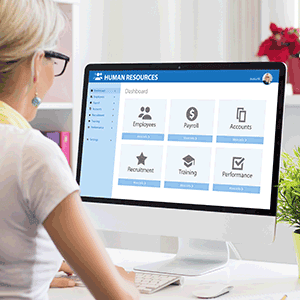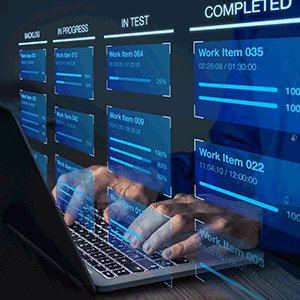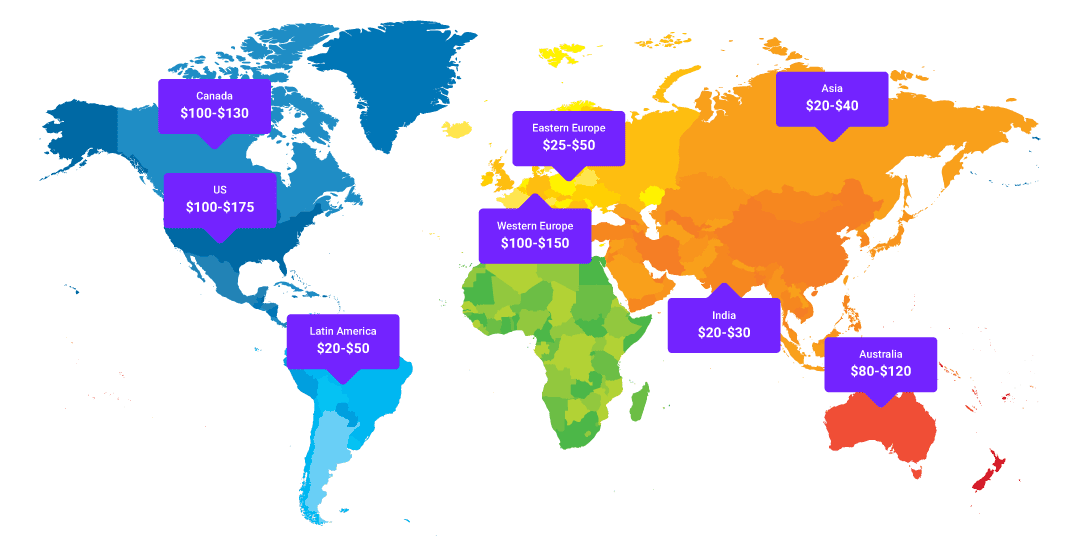An Enterprise Mobile Application is the central nervous system of a business. It connects, coordinates, and empowers various departments, as a neural network enables communication and coordination throughout the body. A well-architected and optimally coded enterprise mobile application ensures efficient data flow, responsiveness to market changes, and streamlined processes, similar to how the central nervous system facilitates sensory perception and feedback. Ultimately, enterprise mobile application development enables businesses to operate at their full potential, adapt to the digital landscape, and achieve sustained success.
Enterprise Mobile Application Development – Creating the Perfect Fit
Enterprise mobile application development can be compared to a skilled tailor specializing in creating custom-made outfits specifically tailored to suit each client’s individual needs. Similarly, enterprise mobile application developers closely examine the business to understand its processes, workflows, and goals to ensure the mobile application perfectly fits its operations.
Just as a tailor selects high-quality fabrics and materials to create a durable and stylish garment, enterprise mobile application developers choose robust mobile development frameworks, programming languages, and design principles to build a secure, efficient, and visually appealing application.
Like a good tailor pays attention to intricate details, enterprise mobile application developers focus on crucial aspects like security, integration with existing systems, user experience, and offline functionality.
Enterprise Mobile Application - A Comprehensive Toolbox
Your business needs the flexibility to choose the specific enterprise mobile applications that suit your business needs and objectives. Enterprise mobile applications are like tools in a toolbox that your business can use to accomplish specific tasks and address different aspects of its operations. Here are some for your consideration:
Communication and Collaboration Apps:
Just as telephones or walkie-talkies, these tools facilitate efficient communication among team members; communication and collaboration apps enable seamless communication and collaboration within the organization.

Customer Relationship Management (CRM) Apps:
CRM apps help businesses organize and track customer interactions like a tracker.

Human Resources (HR) and Employee Management Apps:
These apps provide a centralized system to manage employee information, track performance, and automate HR processes.

Enterprise Resource Planning (ERP) Apps:
ERP apps are like versatile multitools. They integrate and manage various business processes, including finance, inventory, and supply chain, acting as a comprehensive solution to streamline operations.

Field Service Management Apps:
Field service management apps are akin to specialized tools field technicians use. They help manage service requests, track tasks, and access relevant information on the field.

Mobile Banking and Financial Apps:
Like secure vaults, financial apps enable users to perform financial transactions, access account information, and utilize financial services securely.

Productivity and Workflow Apps:
These apps assist individuals and teams in organizing tasks, managing time, and collaborating on documents to enhance productivity.

The Marvels of Enterprise Mobility Development
As you embrace the power of enterprise mobile app development, you become a formidable force in the business universe. With new superpowers, you can propel your status among your competitors, creating a world where your business soars to extraordinary heights!
Enterprise mobile apps empower employees to access crucial business tools and information wherever they go.
In the blink of an eye, enterprise mobile apps accelerate productivity. Employees become lightning-fast in completing tasks, collaborating with teammates, and responding to client requests. Projects that took ages to complete now zoom toward success, leaving competitors in the dust.
Enterprise mobile apps create an impenetrable force field of collaboration. Team members unite, sharing ideas, files, and updates in real-time.
Enterprise mobile apps cloak inefficiencies, leaving only a trail of optimized workflows. Tedious manual processes vanish, replaced by automated systems that save time and reduce errors. The result? A leaner, meaner, and more efficient organization.
Enterprise mobile apps can gather and analyze data, unveiling hidden patterns, trends, and customer preferences. Armed with this knowledge, your business can make smarter decisions, foresee challenges, and seize opportunities like the strategic geniuses you are.
Enterprise mobile apps employ robust encryption, secure authentication, and remote data wipe capabilities, protecting sensitive company and customer information.
Enterprise mobile apps elevate your brand image and leave a lasting impression on customers. They showcase innovation, user-friendliness, and a commitment to staying ahead of the curve. Customers are inexplicably drawn to the allure of these tech-savvy organizations.
0
%
Do companies like what they see?
The Mobile Enterprise Application Market size was valued at USD 90.53 Billion in 2021 and is projected to reach USD 268.14 Billion by 2030, growing at a CAGR of 15.25% from 2022 to 2030.
– Verified Market Research
10 Must-Have Features of An Enterprise Mobile App
By incorporating these practical and essential features, your enterprise mobile app becomes a reliable tool that can greatly enhance its functionality and usefulness for your business. Let’s explore ten must-have features of an enterprise mobile app:
- Digital ID Card: The access control feature of your app acts as a digital ID card, ensuring only authorized individuals within the organization can access its functionalities. It provides a secure login system, verifying each user's identity and protecting sensitive information.
- Access Passes: The permission feature is like access passes at a concert or event; your app grants different levels of access to users based on their roles. It ensures that employees can only access the features and data relevant to their responsibilities, maintaining privacy.
- Seamless Data Bridge: The integration feature establishes a seamless data bridge, connecting various enterprise systems and databases. It enables smooth communication and data exchange between platforms, improving efficiency and eliminating data silos.
- Instant Notifications: With the push notification system, your app informs users in real time. It sends instant notifications for important updates, announcements, or tasks, ensuring employees stay updated and never miss critical information.
- Offline Functionality: Your app must include offline capabilities, allowing users to access and work with essential data without an internet connection. It ensures that employees can continue their tasks uninterrupted, syncing any changes made once the connection is restored.
- Robust Data Protection: This feature lets your app prioritize data security through robust encryption techniques and secure storage. It safeguards sensitive information, preventing unauthorized access and maintaining the confidentiality of critical data.
- Insights and Analytics: Insights and analytics offer a clear picture of app usage, user behavior, and performance metrics. It enables businesses to make informed decisions, identify patterns, and optimize processes for better outcomes.
- Collaboration Tools: Incorporating collaboration tools will enhance teamwork and facilitates seamless communication, document sharing, and project management, promoting collaboration and productivity.
- Customization Options: The customization feature allows you to tailor the interface and settings to your customer’s preferences to suit their needs.
- Scalability and Performance: Ensure the app is designed to handle many users and data without compromising performance. Optimize the app for speed, responsiveness, and scalability to accommodate the growing needs of the enterprise.
Embark On the Journey of Creating An Enterprise Mobile App With the Right Steps
Building a cutting-edge enterprise mobile app is like any grand project – it involves several key steps. Let’s embark on this journey together:
Designing the Blueprint:
Next, you work with talented architects—designers and UX experts—who translate your vision into a captivating user interface. They create wireframes and prototypes, carefully crafting the layout, colors, and navigation.
Crafting the Building Blocks:
Developers write lines of code to build the app’s structure, just like construction workers assemble the steel beams and concrete foundations of buildings. They integrate features, create interactive elements, and ensure smooth functionality.
Rigorous Quality Assurance:
As city inspectors ensure that buildings meet safety standards, testers meticulously examine the app for bugs, glitches, and usability issues.
Security & Compliance:
Automated, predefined security configurations and compliance checks to ensure data protection and regulatory compliance.
Post-Launch Maintenance:
Every building needs ongoing maintenance and updates, and so does your app. Continue to monitor its performance, address user feedback, and release regular updates to enhance its functionality and address any issues.
Laying the Foundation:
The development process starts with thorough planning. Gather your requirements, conduct research, and define the app’s purpose, features, and target audience. It’s like sketching out the blueprint for your city before construction begins.
Assembling the Dream Team:
Every great project requires a skilled team. Similarly, in app development, bring together developers, testers, and project managers who collaborate to transform your design into a functional and appealing app.
Iterative Construction:
During this process, the team builds, tests, and gathers feedback, allowing for adjustments and enhancements. It’s like inspecting and perfecting each building before moving on to the next one.
Launch Day Festivities:
The time has arrived to release the app to the world. You submit it to the app stores, prepare marketing campaigns, and generate buzz. It’s like inviting people to explore your new construction, showcasing its features and benefits.
Remember, each step requires careful planning, skilled professionals, attention to detail, and a commitment to creating an exceptional end product.
Budgeting for Your Enterprise Mobile App Development
When building an enterprise mobile app, there are several cost considerations to keep in mind. Considering these factors from the outset and aligning them with your budget will help ensure a realistic estimation of the total cost to build your enterprise mobile app. Here are some important factors to consider:
The cost of development resources, including hiring skilled developers, designers, and project managers, is a significant consideration. The level of expertise and experience of the team members can impact the overall cost.
The complexity and number of features you want to incorporate into the app can greatly influence the cost. More complex functionality, integrations with existing systems, or advanced features may require additional development time and resources, thus increasing the cost.
Investing in a well-designed user interface and user experience (UI/UX) is crucial for the success of your app. A polished and intuitive design can enhance user engagement and satisfaction but may also require additional design resources and incur higher costs.
Building an app for multiple platforms, such as iOS and Android, increases development efforts and costs. Each platform may have its development requirements and considerations, leading to additional expenses.
Depending on the complexity of your app and its integration with existing enterprise systems, you may need to invest in backend infrastructure development and maintenance. This can include servers, databases, APIs, and other data storage and communication components.
Rigorous testing and quality assurance are vital to ensure your app functions properly across different devices, platforms, and scenarios. Allocating resources for thorough testing can impact the overall cost but helps identify and fix issues early on, reducing potential future expenses.
After launching the app, ongoing maintenance, updates, and support are necessary to address user feedback, fix bugs, and introduce new features. It’s important to allocate resources and budget for long-term app maintenance to ensure its optimal performance and user satisfaction.
Building a secure app that complies with relevant security standards and regulations may require additional investment. Implementing strong data encryption, authentication mechanisms, and other security measures can help protect sensitive enterprise data but may contribute to higher development costs.
Consider the associated costs if your app requires integration with external services or APIs. Some integrations may require licensing fees or additional development efforts to ensure seamless data exchange and functionality.
Efficient project management plays a vital role in controlling costs. Delays in the development process can lead to increased expenses, so having a well-defined timeline and effective project management practices in place is essential.
Lastly, it is advisable to consult with experienced app development professionals or firms to get accurate cost estimates based on your specific requirements.
Based on studies around the world, the average cost of development in different regions is as below

Tips for Creating Successful Mobile Enterprise Apps
- Know Your Users: Understand your users' needs and pain points. Learn about your target users' challenges and design your app to address them effectively.
- Keep it Simple: Like a recipe for a delicious dish, break down and simplify your app's user interface and workflows. Avoid overwhelming users with unnecessary complexity, making it easy for them to navigate and complete tasks smoothly.
- Collaboration is Key: You can win only when you play together as a team. So, foster collaboration between designers, developers, and stakeholders to ensure everyone is working towards the same goal.
- Test Early and Often: Embrace a "try it before you buy it" mentality. Regularly test your app's functionality and usability throughout development, just like a car going through rigorous test drives to ensure it performs flawlessly on the road.
- Embrace Feedback: Gather user, stakeholder, and employee feedback to understand their experiences and perspectives. Incorporate their suggestions to continuously improve your app.
- Prioritize Security: Implement robust security measures to safeguard sensitive business information and user data, ensuring it remains secure from potential threats.
- Adapt to Different Devices: Your app should be like a versatile outfit that fits different body types. Optimize your app to work seamlessly on various devices, screen sizes, and operating systems, ensuring a consistent and enjoyable user experience.
- Offline Functionality: Like a reliable travel companion, make your app capable of functioning offline. Allow users to access important data and perform tasks even without an internet connection, ensuring productivity is not hindered by connectivity issues.
- Regular Updates: Keep your app fresh and exciting, like a TV series that releases new episodes regularly. Roll out updates to introduce new features, fix bugs, and enhance performance, ensuring your app stays relevant and meets evolving user needs.
- Continuous Learning: Embrace a growth mindset. Stay updated with the latest trends and technologies in mobile app development, and be open to learning from industry experts and peers.
Essential Steps for Preparing to Launch Your Mobile Business App
Before setting off, several important steps must be considered to ensure a successful journey in mobile enterprise application development. Let’s explore these steps:
- Define Your Destination: To clearly define the destination of your mobile enterprise application, determine the specific goals, objectives, and expected outcomes of your app. This will guide your development process and keep everyone focused on the end goal.
- Research the Terrain: Similar to studying maps and gathering information about any journey, research the market and competition for your enterprise app. Understand the needs of your target audience, identify existing solutions, and analyze market trends. This knowledge will help you create a unique and valuable app.
- Develop a Solid Strategy: Before embarking on any great mission, you need a well-thought-out strategy. Similarly, develop a solid strategy for your mobile enterprise app. Define your target audience, the app's purpose, and key performance indicators. This strategy will serve as your guiding compass throughout the development process.
- User Experience Design: Just as explorers need a well-designed map, prioritize user experience design for your app. Create intuitive interfaces, easy navigation, and visually appealing layouts. Consider and incorporate user feedback into the design to ensure an engaging and seamless user experience.
- Technical Feasibility Assessment: Evaluate the technical feasibility of your app. Assess the compatibility of your desired features with the chosen platforms, frameworks, and technologies. This assessment helps identify potential challenges and allows you to make informed decisions.
- App Development Approach: Like choosing the right strategy to tackle different challenges in a treasure hunt, select an appropriate app development approach. Decide whether to build a native app, cross-platform app, or leverage hybrid development. Consider factors such as development time, budget, and target audience to choose the most suitable approach.
- Test and Quality Assurance: Similar to testing equipment and ensuring it functions properly for gold mining, conduct thorough testing and quality assurance for your app. Test its functionality, usability, performance, and compatibility across various devices and platforms. This step helps identify and address any issues before launch.
- Security and Compliance: Just as you secure gold you find during mining, prioritize security and compliance for your app. Implement robust security measures to protect user data, ensure secure transmission, and comply with relevant regulations. This protects both your users and your organization from potential risks.
- Deployment and Launch Plan: Create a detailed deployment and launch plan for your app. Determine the appropriate app stores or distribution channels, set a launch date, and prepare all the necessary assets. A well-executed plan ensures a smooth and impactful app launch.
- User Training and Support: Like providing guidance and support to fellow adventurers during a treasure hunt, offer user training and support for your app. Develop user documentation, provide tutorials, and offer channels for user assistance. This empowers users to make the most of your app and enhances their overall experience.
- Performance Monitoring and Iteration: Just as you assess your progress during gold mining and make adjustments, monitor your app's performance after launch. Track user feedback, collect analytics, and identify areas for improvement. Continuously iterate and enhance your app to meet evolving user needs and maintain high performance.
By considering these steps, you’ll be well-equipped to navigate the challenges and ensure a successful launch of your mobile enterprise app.
Use Cases of Enterprise Mobile App
Enterprise mobile application development has revolutionized the way businesses operate by providing tailored solutions to specific challenges. Here are a few use cases that highlight the solutions, challenges addressed, and benefits gained through enterprise mobile app development:
Field Service Management:
Solution:
A mobile app that enables field service technicians to access work orders, manage tasks, and communicate with the central office.
Challenges addressed:
Lack of real-time updates, inefficient communication, and manual paperwork.
Benefits:
Improved productivity and efficiency, faster response times, streamlined workflows, enhanced customer satisfaction, and accurate tracking of service requests.
Inventory Management:
Solution:
A mobile app that allows employees to manage inventory, track stock levels, and process orders.
Challenges addressed:
Manual inventory tracking, inventory discrepancies, time-consuming stock audits, and delayed order processing.
Benefits:
Real-time inventory visibility, accurate stock management, reduced stockouts, streamlined order fulfillment, improved supply chain efficiency, and cost savings through optimized inventory levels.
A custom-built unified platform enables effective lead management for moving companies. It centralizes lead tracking, capturing information from various sources and ensuring no leads are missed. The platform automates lead distribution based on criteria such as location and availability, ensuring prompt responses. It facilitates lead nurturing and engagement through communication tools and integration with CRM systems. Overall, the platform streamlines the lead management process, improving the chances of converting leads into customers and optimizing the sales process.
Did You Know
Inventory Management Software Market size surpassed USD 3 billion in 2022 and is anticipated to exhibit a CAGR of 5% between 2023 and 2032
– Global Market Insights
Sales Force Automation:
Solution:
A mobile app that equips sales representatives with customer information, product catalogs, and order management capabilities.
Challenges addressed:
Disconnected sales processes, inefficient data entry, limited access to product information, and delayed order processing.
Benefits:
Enhanced sales productivity, improved customer engagement, faster order processing, real-time sales data analysis, streamlined sales workflows, and increased revenue through improved sales effectiveness.
Did You Know
The global sales force automation software market size was valued at USD 7.29 billion in 2019 and is expected to grow at a compound annual growth rate (CAGR) of 8.3% from 2020 to 2027.
– Grand View Research
Employee Collaboration:
Solution:
A mobile app that facilitates seamless communication, collaboration, and knowledge sharing among employees.
Challenges addressed:
Siloed communication, difficulty accessing the information on the go, and lack of centralized collaboration tools.
Benefits:
Enhanced teamwork and collaboration, increased productivity, improved employee engagement, faster decision-making, reduced email overload, and efficient knowledge sharing across the organization.
Did You Know
A company’s collaboration index increases sales by 27% and improves customer satisfaction ratings by 41%. Collaboration improves product quality by 34% and improves product development by 30%.
– Frost and Sullivan
Employee Collaboration:
Solution:
A mobile app that offers on-the-go training modules, educational resources, and assessments for employees.
Challenges addressed:
Limited access to training materials, time constraints for traditional training sessions, and difficulty tracking employee progress.
Benefits:
Flexible learning options, continuous skill development, improved employee knowledge retention, reduced training costs, enhanced employee satisfaction and engagement, and faster onboarding for new hires.
Customer Relationship Management (CRM):
Solution:
A mobile app that empowers sales and customer support teams to access customer data, manage leads, and track interactions.
Challenges addressed:
include incomplete customer data, limited access to CRM systems on the fly, and delayed response times.
Benefits:
Improved customer service, personalized interactions, increased sales effectiveness, enhanced customer satisfaction, efficient lead management, and data-driven insights for better decision-making.
Did You Know
65% of companies using a mobile CRM are achieving their sales quotas while only 22% of reps using non-mobile CRM have reached the same targets.
– Nucleus Research
Expense Management:
Solution:
A mobile app that simplifies employee expense tracking, receipt capture, and reimbursement processes.
Challenges addressed:
Manual expense reporting, lost receipts, time-consuming approval workflows, and lack of visibility into expenses.
Benefits:
Streamlined expense management, accurate expense tracking, faster reimbursement cycles, reduced administrative burden, improved compliance, and cost control through data-driven insights.
Collaboration and Communication:
Solution:
A mobile app that enables seamless collaboration, instant messaging, document sharing, and project management across teams.
Challenges addressed:
Fragmented communication channels, information silos, difficulty accessing resources remotely, and lack of centralized collaboration tools.
Benefits:
Enhanced teamwork and productivity, efficient communication, faster decision-making, improved knowledge sharing, streamlined project management, and increased employee engagement.
Business Intelligence and Analytics:
Solution:
A mobile app that provides real-time access to key business metrics, dashboards, and data visualization tools for informed decision-making.
Challenges addressed:
Manual data analysis, delayed reporting, data silos, and limited access to insights.
Benefits:
Data-driven decision-making, improved visibility into business performance, actionable insights, enhanced forecasting accuracy, better strategic planning, and increased operational efficiency.
Workforce Management:
Solution:
A mobile app that facilitates employee scheduling, time tracking, task management, and performance monitoring.
Challenges addressed:
Manual scheduling processes, inefficient time tracking, difficulty managing remote teams, and lack of real-time performance monitoring.
Benefits:
Efficient workforce scheduling, accurate time tracking, streamlined task management, improved employee productivity, enhanced workforce visibility, and data-driven performance analysis.
Did You Know
Of the workforce management applications market, the time and attendance segment was by far the biggest segment in the market in 2020, generating around 2.4 billion U.S. dollars in revenue. From 2018 to 2020 this segment gained nearly 700 million U.S. dollars and is projected to continue increasing.
– Statista
How Can Fingent Help You in Your Journey to Creating and Launching an Enterprise Mobile App?
We at Fingent top custom software development company, can collaborate with you to define the goals, objectives, and scope of your mobile app project, and provide strategic guidance to ensure your app aligns with your overall business strategy. We specialize in custom mobile app development that meets your specific needs.
Our team of skilled developers can translate your ideas into a fully functional and user-friendly app. Since we understand the importance of user experience, we can employ user-centric design principles to create intuitive and visually appealing interfaces for your app.
Fingent has extensive knowledge and expertise in various technologies, frameworks, and programming languages. And we prioritize quality throughout the app development process by conducting rigorous testing and quality assurance measures to ensure your app functions flawlessly across different devices, platforms, and user scenarios.
Apart from these and more, Fingent provides ongoing support and maintenance services to ensure your app runs smoothly even after launch. Our support team is readily available to address any technical issues and provide timely assistance. Just get in touch with us.
FAQs
Enterprise mobile apps offer numerous benefits such as improved productivity, streamlined workflows, enhanced customer service, data-driven decision-making, and better collaboration. They empower businesses to stay competitive in the digital era by leveraging the power of mobile technologies.
The choice of platforms depends on your target audience and business requirements. Native app development offers the best performance and user experience but requires separate development for each platform (e.g., iOS and Android). Cross-platform development allows building apps that work across multiple platforms using shared code. Hybrid development combines web technologies with native capabilities.
The development timeline depends on several factors, including app complexity, features, design, integrations, and testing requirements. On average, a well-planned enterprise mobile app development project can take anywhere from a few months to a year or more.
Security is a critical aspect of enterprise mobile app development. To ensure security, follow best practices such as implementing secure authentication and authorization mechanisms, using encrypted data storage, performing regular security audits, and adhering to industry standards and compliance regulations.
User experience (UX) design plays a crucial role in making your app user-friendly and engaging. Focus on intuitive navigation, visually appealing interfaces, responsive design, and seamless interactions. Conduct user testing and gather feedback to continuously improve the app’s usability and user satisfaction.
Integration with existing enterprise systems can be achieved through APIs (Application Programming Interfaces) and web services. These interfaces allow data exchange and communication between the mobile app and backend systems, such as CRM, ERP, or databases.
To ensure scalability, consider cloud hosting, scalable architecture, and efficient resource utilization. Design your app to handle increasing user loads and anticipate future growth. Regular performance monitoring and optimization are essential for maintaining app performance as user demand grows.
Ongoing maintenance and support involve addressing bug fixes, implementing updates, and adding new features as needed. It also includes monitoring app performance, ensuring compatibility with new OS versions, and providing user support. Regular maintenance helps keep the app secure, functional, and aligned with evolving business needs.